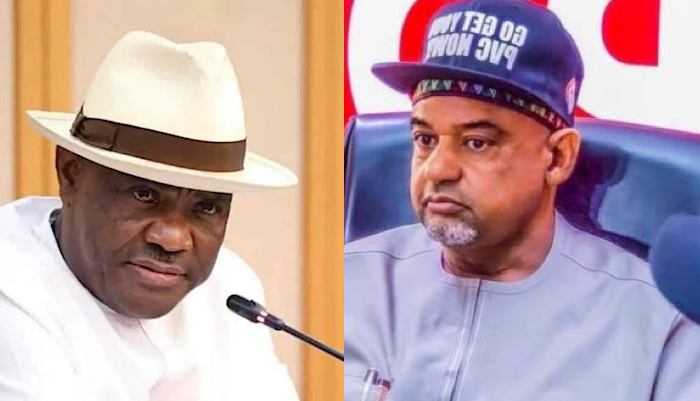The political landscape within Nigeria’s Peoples Democratic Party (PDP) is currently experiencing significant turbulence, marked by a power struggle and conflicting directives from key figures within the party. This internal conflict revolves around the position and authority of the National Secretary, Senator Samuel Anyanwu, and highlights the deeper divisions within the PDP following its defeat in the 2023 presidential elections. The recent actions of the Acting National Chairman, Umar Damagum, have ignited controversy and drawn sharp criticism from prominent party members, most notably Nyesom Wike, the Minister of the Federal Capital Territory.
The central issue stems from Damagum’s directive to Anyanwu to resume duties at the party’s national secretariat. This seemingly innocuous instruction has been interpreted by Wike as an overreach of authority and a symptom of the broader dysfunction within the PDP. Wike publicly challenged Damagum’s directive, arguing that the National Secretary was not appointed by the Acting Chairman and therefore not subject to his direct orders. This challenge underscores the underlying tension between different factions vying for control within the party. Wike’s pointed remarks, delivered during a public event, further escalated the situation and brought the internal party dispute into the national spotlight. His criticism extended beyond this specific incident to encompass what he perceives as a broader pattern of poor leadership and misguided actions by the current PDP leadership.
Wike’s critique went beyond the procedural aspects of Anyanwu’s situation and delved into the party’s strategic decision-making. He specifically targeted the PDP’s recent consultation with the Independent National Electoral Commission (INEC), characterizing it as a display of ignorance and a shameful admission of incompetence. The fact that the PDP sought guidance from INEC on internal party matters, according to Wike, revealed a fundamental lack of understanding of the party’s own constitution and the relevant legal framework. This public rebuke further exposed the internal divisions within the PDP and highlighted the perceived lack of clear direction from the acting leadership. Wike’s strong words served as a pointed indictment of the party’s current trajectory and a call for more informed and strategic leadership.
In a surprising turn of events, following the meeting with INEC, the PDP reversed its earlier stance on Anyanwu and postponed its planned National Executive Committee (NEC) meeting. This reversal, while ostensibly presenting a unified front, further underscores the internal struggles and the influence of external factors on the party’s decision-making processes. Damagum’s explanation of the decision as “difficult but widely accepted” suggests an attempt to portray the shift as a strategic move rather than a reaction to internal pressure or external guidance. The postponement of the NEC meeting and the decision to hold an expanded National Caucus meeting instead suggest a desire to further deliberate on the sensitive issues plaguing the party and potentially reach a more consensual approach to resolving internal conflicts.
The unfolding drama within the PDP reveals a party grappling with its identity and direction in the aftermath of its electoral defeat. The conflict between Wike and Damagum represents a microcosm of the larger power struggle and the competing visions for the party’s future. Wike’s outspoken criticism, while potentially disruptive, highlights the need for greater transparency and accountability within the party. His challenge to the acting chairman’s authority raises fundamental questions about the legitimacy of the current leadership and the need for a more democratic and inclusive decision-making process within the PDP.
The PDP’s interaction with INEC, followed by the reversal of its decision on Anyanwu and the postponement of the NEC meeting, underscores the party’s vulnerability and its apparent reliance on external guidance. This reliance raises concerns about the party’s ability to chart its own course and articulate a clear vision for the future. The decision to hold an expanded National Caucus meeting suggests a recognition of the need for broader consultation and a more inclusive approach to addressing the party’s internal challenges. The outcome of this meeting will likely be crucial in determining the PDP’s ability to overcome its internal divisions and regain its footing as a viable political force in Nigeria. The party’s ability to navigate these turbulent waters and emerge stronger and more unified will be a key determinant of its future prospects.


